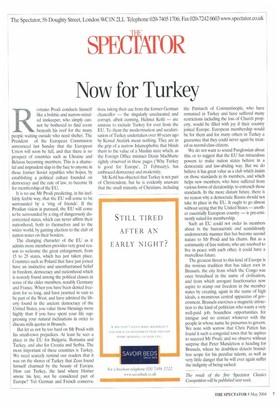VRAT for Turkey R omano Prodi conducts himself like a bolshie
and narrow-minded innkeeper, who simply cannot be bothered to find room beneath his roof for the many people waiting outside who need shelter. The President of the European Commission announced last Sunday that the European Union will soon be full, and that there is no prospect of countries such as Ukraine and Belarus becoming members. This is a shameful and imprudent slap in the face to anyone in those former Soviet republics who hopes, by establishing a political culture founded on democracy and the rule of law, to become fit for membership of the EU.
It is no use Mr Prodi predicting, in his ineffably feeble way, that the EU will come to be surrounded by a 'ring of friends'. If the Prodian vision is pursued, the EU will come to be surrounded by a ring of dangerously discontented states, which can never affirm their nationhood, both to themselves and to the wider world, by gaining election to the club of nation states on their borders.
The changing character of the EU as it admits more members provides very good reason to welcome the great enlargement, from 15 to 25 states, which has just taken place. Countries such as Poland that have just joined have an instinctive and unembarrassed belief in freedom, democracy and nationhood which is scarcely found among the political classes in some of the older members, notably Germany and France. When you have been denied freedom for so long, and have yearned in vain to be part of the West, and have admired the liberty found in the ancient democracy of the United States, you value those blessings more highly than if you have spent your life suppressing your natural inclinations in order to discuss milk quotas in Brussels.
But let us not be too hard on Mr Prodi with his small-town prejudices. At least he sees a place in the EU for Bulgaria, Romania and Turkey, and also for Croatia and Serbia. The most important of these countries is Turkey. We need scarcely remind our readers that it was on the shores of Turkey that Zeus found himself charmed by the beauty of Europa. How can Turkey, the land where Homer smote his lyre, not be considered part of Europe? Yet German and French conserva
tives, taking their cue from the former German chancellor — the singularly uneducated and corrupt, albeit cunning, Helmut Kohl — are anxious to exclude Turkey for ever from the EU. To them the modernisation and secularisation of Turkey undertaken over 80 years ago by Kemal Atatbrk mean nothing. They are in the grip of a narrow Islamophobia that blinds them to the value of a Muslim state which, as the Foreign Office minister Denis MacShane rightly observed in these pages (Why Turkey is good for Europe', 21 February), has embraced democracy and modernity.
Mr Kohl has objected that Turkey is not part of Christendom, but he is evidently unaware that the small minority of Christians, including the Patriarch of Constantinople, who have remained in Turkey and have suffered many restrictions including the loss of Church property, would be filled with joy if their country joined Europe. European membership would be for them and for many others in Turkey a guarantee that they could never again be treated as second-class citizens.
We do not want to sound Panglossian about this, or to suggest that the EU has miraculous powers to make nation states behave in a democratic and law-abiding way. But we do believe it has great value as a club which insists on those standards in its members, and which helps new members, who have suffered from various forms of dictatorship, to entrench those standards. In the more distant future, there is no reason why a democratic Russia should not take its place in the EU. It ought to go almost without saying that the United States — another essentially European country — is pre-eminently suited for membership.
Such an EU could not order its members about in the bureaucratic and scandalously undemocratic manner that has become second nature to Mr Prodi and his chums. But as a community of free nations, who are resolved to live in peace with each other, it could have a marvellous future.
The greatest threat to this kind of Europe is the noxious tradition that has taken root in Brussels, the city from which the Congo was once brutalised in the name of civilisation, and from which arrogant functionaries now aspire to stamp out freedom in the member states by creating, again in the name of high ideals, a monstrous central apparatus of government. Brussels exercises a magnetic attraction to the kind of politician who wants a very well-paid job, boundless opportunities for intrigue and no contact whatever with the people in whose name he presumes to govern. We note with sorrow that Chris Patten has found it such a congenial town that he aspires to succeed Mr Prodi; and we observe without surprise that Peter Mandelson is heading for Brussels, where he doubtless detects boundless scope for his peculiar talents, as well as very little danger that he will ever again suffer the indignity of being sacked.












































































 Previous page
Previous page